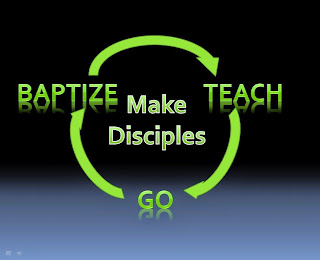
There is a lot of misinformation about evangelists.
Almost everyone has an opinion on the matter.
Would you agree that it is more important to believe what the Bible actually teaches rather than what we just think it teaches?
Errors don't become true just because they are repeated long enough and loud enough.
The ten most common misconceptions about evangelists are repeated over and over. Although commonly believed all of these descriptions about the purpose and function of evangelists are biblically invalid.
The purpose of Fourth Year Ministries is not to criticize. The purpose is to edify. To build up. To encourage. Therefore, it is not enough to simply point out the errors in other views. We must go a step further to provide a description of the role, purpose, and function of evangelists that is valid based on the teaching of the Bible.
Any true interpretation of Scripture will be able to endure under scrutiny.
The truth of Scripture is that evangelists are given by Jesus as a permanent part of the oversight of the local church.
What Is An Evangelist?
Put simply: An evangelist is an officer given by Christ to govern, oversee, and equip the saints in a local church setting. The evangelist serves the local church as a critically important member of the local church eldership.
Connecting The Theological Dots
Every theologian is essentially connecting the dots. Christians all have the same information revealed in the Bible. We just don't all connect the dots the same ways.When you connect the dots differently, the picture changes.
The most common views on what an evangelist is and does all fail to account for all of the dots. Therefore, the picture is incomplete. While there may be benefits from each of the alternatives, they still fall short of the ideal.
In order to walk most fully in the design of our Lord and Savior, we must take into account all of the information. Connect all of the dots. Only then will we have the full picture.
Church Leadership
Discussing church leadership can be controversial. I know.We've been told this is non-essential.
I agree it is not a salvation issue.
But does that mean it isn't important?
What does leadership do? It leads.
The nature and character of our leadership therefore affects the direction and aims of our local churches.
We may not be talking about salvation issues, but we are certainly talking about our purpose. If our leadership is off, our direction will be, too.
In the book of Ephesians, the Apostle Paul says this about the church in Ephesians 3:20-21,
Now to him who by the power that is working within us is able to do far beyond all that we ask or think, to him be the glory in the church and in Christ Jesus to all generations, forever and ever. Amen.
Is this your experience? Is this the experience of the members of your community?
If your local church disappeared, what difference would it make? How is God being glorified in and through your local church ministry?
These questions matter. Do you agree?
Elders and Deacons
In the New Testament, every church had a plurality of elders. That is, more than one elder.The universal pattern of local church leadership was elders and deacons. When describing the office of elder the Bible uses two terms interchangeably: elders and overseers. Both of these terms refer to the same position in the church and occur frequently in the same context regarding the same individuals (e.g., Titus 1:6-7).
Sometimes people try and make exceptions. Some go beyond what the Scriptures say in making assertions that are contrary to this universal pattern. None of the exceptions can stand when examined more closely.
The two main counter-examples given for the senior pastor or singular leader model of leadership are James in Jerusalem and Timothy in Ephesus. The assertion is made that these men were the Senior Pastors in their respective locations.
Setting aside the fact that neither James nor Timothy are ever titled as "pastor" (and especially not "senior pastor") in the Scriptures, both the church of Jerusalem and Ephesus had elders. For sure. No doubt about it.
The famous Acts 15 Jerusalem Council passage which is the main evidence for James as the leader of the church in Jerusalem tells us clearly that there were elders in the church. The decision doesn't come from James but from the apostles and elders, along with the whole church.
Then the apostles and elders, with the whole church, decided to send men chosen from among them, Judas called Barsabbas and Silas, leaders among the brothers, to Antioch with Paul and Barnabas. They sent this letter with them: From the apostles and elders, your brothers, to the Gentile brothers and sisters in Antioch, Syria, and Cilicia, greetings! (Acts 15:22-23, bold added)
Likewise, in Ephesus we know that there were elders (Acts 20:16-19) and that Timothy was given criteria on how to appoint more elders (1 Timothy 3:1-7) and to honor, protect, and hold accountable the current elders (1 Timothy 5:17-20).
What's The Difference Between An Elder And A Deacon?
The two offices in church leadership have the same moral and ethical qualifications. The main difference is that the elder is a teaching office. The deacon is an office of service.
You can read the main passages in Acts 6; 1 Timothy 3; and Titus 1 to see this distinction for yourself.
Leadership In Ephesus
While we know from Acts 20 and 1 Timothy that elders served to lead the church in Ephesus, a peculiar fact emerges in the letter to the Ephesians.
The typical leadership offices of elders and deacons are never mentioned.
This is no small detail.
Some commentators have concluded that Paul must not have written this letter. They claim that since elders and deacons are the universal pattern of New Testament church leadership, the epistle to the Ephesians must be a later addition or written by someone else because it deviates from this universal pattern.
That conclusion is not necessary. It's a bit extreme.
A better conclusion is that when Paul discusses the leadership roles of Apostles, Prophets, Evangelists, Pastors and Teachers he is still operating within the same universal pattern of church leadership throughout the New Testament.
Offices and Officers
The New Testament offices of church leadership are elders and deacons.Elders have teaching responsibilities. Deacons do not.
Let's look closely at what Paul says about the officers mentioned in Ephesians 4:11-12.
It was he who gave some as apostles, some as prophets, some as evangelists, and some as pastors and teachers, to equip the saints for the work of ministry, that is, to build up the body of Christ
Equipping the saints is going to involve teaching in some form or fashion.
We don't need to throw the baby out with the bath water. We can build from what we already know for sure. That way we can keep this dot in place and not miss it.
The officers listed in Ephesians 4:11 do not represent a deviation from the universal New Testament pattern of church leadership.
These officers serve the church in the office of elder.
Is There Any Other Biblical Evidence This Is True?
As it turns out, yes there is.
Look at how some of the apostles define themselves. The Apostle John begins his second epistle like this (2 John 1:1-2, bold added):
From the elder, to an elect lady and her children, whom I love in truth (and not I alone, but also all those who know the truth), because of the truth that resides in us and will be with us forever.
The Apostle Peter likewise had some encouragement to elders. Here's how he addressed them (1 Peter 5:1, bold added):
So as your fellow elder and a witness of Christ's sufferings and as one who shares in the glory that will be revealed, I urge the elders among you...
The Apostles referred to themselves as elders. They were a special type of overseer to be sure. Even so, the church officers we know as apostles served the church (both universally and locally) within the office of elder.
Different Aspects of Oversight
Even if the general aspect of teaching and oversight is shared, the specifics are often different.
Consider Peter and Paul. Both men were called to be apostles by Jesus. Peter was apostle to the Jews. Paul was apostle to the Gentiles.
Both overseers. Different scopes.
As apostles, both Peter and Paul had foundational and universally reaching ministries. Paul, as the apostle to the Gentiles, planted a lot of churches in Gentile regions.
Peter had no problem writing to these same areas and churches. If you look on a map at the locations listed in Peter's epistles you'll see he is writing to Paul's territories. This is within the scope of all apostolic ministry. Look at 2 Peter 3:2 (bold added):
I want you to recall both the predictions foretold by the holy prophets and the commandment of the Lord and Savior through your apostles.
Peter's statement illustrates that both the Apostles and Prophets were revelatory. Their authority was for all believers, in all places, at all times. The Apostles and Prophets are foundational for the church universal.
Paul agreed with this sentiment fully. He said so in Ephesians 2:19-22 (bold added):
So then you are no longer foreigners and noncitizens, but you are fellow citizens with the saints and members of God's household, because you have been built on the foundation of the apostles and prophets, with Christ Jesus himself as the cornerstone. In him the whole building, being joined together, grows into a holy temple in the Lord, in whom you also are being built together into a dwelling place of God in the Spirit.
Local Leadership
While the Apostles and Prophets were revelatory and universal, not all church leadership is.
The evangelists and pastor/teachers are non-revelatory. They don't write any Scripture. They only teach what has already been revealed (e.g., Jude 1:3).
Likewise, the authority and oversight of evangelists and pastor/teachers extends only to the fellowship they serve. While the Apostle Peter could write authoritatively to the churches Paul planted and expect them to obey, we see no biblical example of local church elders imposing doctrines or compelling obedience apart from the apostles upon other local fellowships.
Instead, the consistent exhortation to local fellowship and local church elders is to serve, honor, and submit to one another.
Why Plurality of Leaders?
The purpose of elders is multi-faceted. They are leaders, teachers, and shepherds. They instruct in right doctrine. Protect against false teaching. Serve the body in word and deed. Administer discipline as necessary.
Local church ministry is also multi-faceted. There is an internal purpose and focus. There is also an external purpose and focus.
Neither is more important than the other. They are like the wings of an airplane. You need both. They work together.
But they don't both do the same things. They are pointed in opposite directions.
Have you ever noticed that most churches take either the internal or the external mission more seriously than the other?
Some fellowships are great at outreach. They just don't focus too much on discipleship, training, or equipping.
Other fellowships are great at teaching the saints. But they are poor at evangelizing and reaching those separated from God with the gospel.
But where does the Bible teach that it is acceptable for us to focus on only one of these pursuits?
From a pragmatic viewpoint, a small enough group of believers would not need more than one capable shepherd or overseer. Many small local churches have only one Pastor. That Pastor is able to accomplish all of his necessary job duties per the expectations of the fellowship.
But the New Testament has no example of a singular elder led church. None. Zero. Nada.
Is it because we do such a better job in training our leaders through seminary than the New Testament churches had through the Apostles?
I doubt it.
If the picture we've been drawing is correct, it answers this question directly.
We have a plurality of elders in every local church because Christ gave both evangelists and pastor/teachers as officers to oversee the external and internal missions of the church.
The elders of every church are plural because there are always at least two: an evangelist and a pastor/teacher. There could certainly be more. But there weren't less.
Calling For The Elders
Many commentators have no problem equating Pastors with the Elders and Overseers. But what justification do we have for eliminating evangelists from this office?
The answer seems clear. We have no evidence that this exclusion is warranted.
Although our own culture emphasizes pastors to a great extent, the New Testament does not. Elders, sure. But not specifically pastors.
You can't find any passage, outside of Ephesians 4:11, that uses pastors in accordance with the modern usage.
Never when calling for leaders of the local church, nor when addressing leaders, does the Scripture address the "pastors." It's always the elders, the overseers, and the deacons.
But the Scriptures do record an evangelist serving in the church at Caesarea. Check out Acts 21:8,
On the next day we left and came to Caesarea, and entered the house of Philip the evangelist, who was one of the seven, and stayed with him.
As "one of the seven" we know Philip met the ethical and moral qualifications for being an elder and a deacon. He was vetted by the apostles and church in Jerusalem already (see Acts 6:3-6). Here in Acts 21:8, the evangelist in Caesarea opens his home and exercises hospitality to Paul and his team of travelling workers.
A qualification of elders and overseers is that they must be hospitable (Titus 1:8). The evangelist in Caesarea demonstrates his hospitality. If Philip were not an elder, would it not be more natural for Paul and his companions to stay with an elder?
When taken together with all of the New Testament teaching a clear picture begins to emerge. The officers listed in Ephesians 4:11 are not intended to operate outside of the offices of church leadership. Instead, these officers are different types of elders who oversee different aspects of the life and ministry of the church.
It does an injustice to the teaching of Scripture to reduce "the elders" to simply being "the pastors." Pastors would certainly be included. Yet, we must admit that the New Testament does not emphasize pastors to the extent that we do today.
A full theology of church leadership will include all the officers given within the office of elder.
Concluding Thoughts
When we take all of the biblical data into account the full picture emerges: Evangelists are given by Christ to serve as officers in local church governance to oversee the external mission of the church. Evangelists work in close conjunction with their local church counter-parts, the pastor/teachers, who oversee the internal mission. Both local church overseers serve as elders and build off the universal foundation laid by the apostles, prophets, and Christ Jesus Himself.
Do you need to have an evangelist to have a New Testament church? No.
You don't need a pastor, Bibles, or a building either.
However, is it wise to do without any of these things if you don't have to?
I think the answer to that question is also No.
When we deviate from Christ's design the results will always be negative. Always.
We may not notice them immediately. We may be able to see the Lord work in and through our ministries. But our effectiveness will be diminished.
Christ has given the officers in Ephesians 4:11 as a gift to His church. We ignore and redefine these gifts to our own detriment. We must strive to the biblical ideal, empowered by the grace of our God and Savior. We must walk by faith in His revealed will, not by our own sight and what seems right to us. Read Ephesians 4:11-16 again:
It was he who gave some as apostles, some as prophets, some as evangelists, and some as pastors and teachers, to equip the saints for the work of ministry, that is, to build up the body of Christ, until we all attain to the unity of the faith and of the knowledge of the Son of God– a mature person, attaining to the measure of Christ's full stature. So we are no longer to be children, tossed back and forth by waves and carried about by every wind of teaching by the trickery of people who craftily carry out their deceitful schemes. But practicing the truth in love, we will in all things grow up into Christ, who is the head. From him the whole body grows, fitted and held together through every supporting ligament. As each one does its part, the body grows in love.
This is what's at stake. We're not just building social clubs. We aren't interested in building our own mini-kingdoms. We are the body of Christ. Nothing less.






Comments